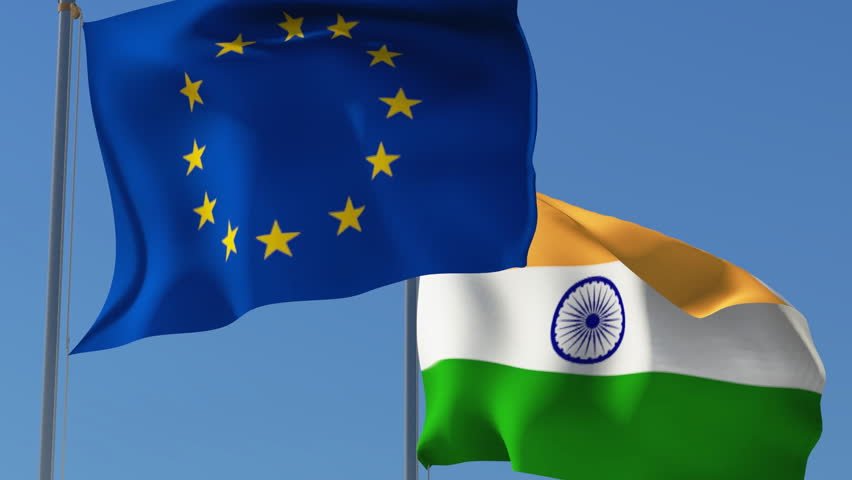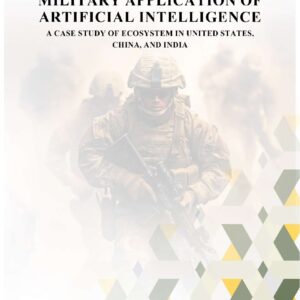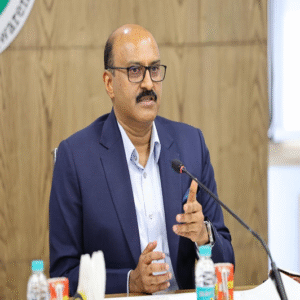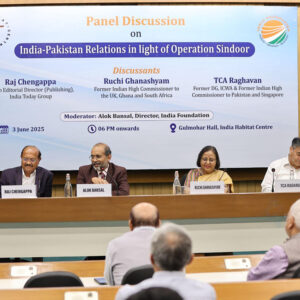A dangerous great game is being played out in Ukraine. It has created new fault lines in the existing world order. Unilateral sanctions imposed by the US against Russia has severely impacted global economic recovery after the pandemic, raised oil and gas prices, created domestic inflationary pressures due to external factors and a looming food crisis. All these developments come in the background of a pandemic which is yet to become endemic and new health scares including a monkey pox breakout in several countries.
The meltdown in Ukraine was in the making since 2014. Emboldened by NATO membership for the Baltic States at a time when Putin was not in power, President Biden, under attack from the Republicans for the debacle in Afghanistan and facing a difficult election in the Senate by November, saw in Ukraine’s candidature for NATO membership, an excellent election gambit for domestic purposes[i].
A Cold War warrior, President Biden ignored repeated Russian protests that this was a red line that could not be ignored. Russia would not accept NATO’s nuclear weapons on Ukraine’s border with Russia. Foreign office pundits, ignorant of European history, overlooked that large parts of Ukraine have been Russian for centuries. Ukrainians come from the same soil and are fellow Slavs. Their religion is Orthodox and from the 18th century, fought invaders together with Russians. For the Russians, Ukraine was and will remain part of their history, culture and civilisation.
Buoyed by promises of support, President Zelensky was in no mood to back down. Ukraine was already in a partnership arrangement with NATO through the ‘NATO Enhanced Opportunity Partnership’. Zelensky mistakenly calculated that NATO would provide military support in the unlikely event of a Russian incursion. Indeed, he repeatedly asserted that a Russian attack was neither imminent nor forthcoming.
It is really creditable that the outmatched Ukrainian forces showed great courage and did not back down. Kiev did not fall like Kabul. Zelenksky did not abandon his people despite early American offers to airlift him. Unfortunately, not losing did not translate into a victory for Ukraine. It came with huge destruction of Ukraine’s cities and infrastructure and massive displacement of her population. Russia now holds significantly more territory in Ukraine than before 24th February 2022. Not losing is looking uncomfortably a lot more like losing rather than winning. There is also the economic impact of the war on Ukraine which is facing collapse of its GDP by 45 to 50%.
From India’s perspective, the inexorable loss of Ukraine’s sovereignty in its Eastern flank, accompanied by a fatal weakening of Russia’s economic and military might, raised the prospect of a severely weakened Russia, hitherto India’s main arms supplier, becoming a junior partner of an aggressive and emboldened China. This is an alarming scenario given China’s implacable hostility to India’s rise. It has increased pressure on India to distance itself from Russia, ignoring her core national interests.
The Ukraine crisis has shifted attention of the West away from China and the threat China poses to the existing world order. These concerns have now been addressed to a certain extent by the USA as articulated by Lloyd Austin, US Defence Secretary at the latest Shangri-La Dialogue from 10th to 12th June 22 in Singapore. From informing the gathering that China was “becoming more coercive and aggressive” to publicly warning India of China’s strengthening of its military infrastructure across the LAC, Austin was conveying a clear warning that the US regards the Indo-Pacific as the heart of America’s grand strategy. This was necessary to reassure a nervous EU that US will not leave an increasingly divided EU to sort out the end game in Ukraine.[ii]
The next NATO Summit in Madrid on 29th to 30th June 22 would possibly carry the same reassurance to a Continent increasingly facing the pressure of reduced oil and gas supplies from Russia along with the growing conviction that the war in Ukraine cannot be won. India’s foreign policy and options had to address the puzzling ambivalence of the EU towards Russia including its place in Europe, its history and geography as a dominant European State and the necessity therefore to accommodate Russia within a broader European economic and security framework. Without a pragmatic mid-course correction, EU’s present policy of encouraging Ukraine to fight back and not accept peace negotiations risks escalating the war into a broader conflict. Finland and Sweden wish to join NATO, while Ukraine along with Moldova has just acquired ‘candidate status’ to join EU at a future date. Russia which started the conflict because of Zelensky’s shrill calls to join NATO (a prospect which it turned out was not acceptable to NATO itself) now feels further encircled.
Where is India situated? The decline of ‘Pax Americana’ and the precipitous and disastrous retreat from Kabul on 15th August 2021, leaving ordinary Afghans who had welcomed the Western forces to their fate, was a rude reminder to India, a key strategic partner of the US and EU, that she stood alone in any military confrontation with China. At the same time, India’s security interests are firmly anchored with the West, with the US, the EU and QUAD. But the unilateral Western sanctions and the astronomical rise in oil and gas prices have forced India to purchase discounted Russian oil even it is a fraction of what EU purchases from Russia. India’s dependence on Russian arms and spare parts from Ukraine places her on the horns of a dilemma.
When the conflict commenced, India had to repeatedly clarify her principled position through detailed explanations of vote in the UN and through public statements. Prime Minister Narendra Modi repeatedly appealed for an immediate ceasefire and cessation of hostilities. Later, India welcomed the Secretary-General’s engagement with the Russian and Ukraine leadership and the humanitarian reprieve secured.
As India’s External Affairs Minister Dr. S. Jaishankar noted, India remains on the side of peace and diplomacy and is guided by her national interests. We have underlined that there is no winning side and a return to dialogue and diplomacy was the only way forward. We have in our statements at the UN highlighted: “It is in our collective interest to work constructively, both inside the United Nations and outside, towards seeking an early resolution to this conflict.” India added: “the global order is anchored in international law, UN Charter and respect for territorial integrity and sovereignty of states”.[iii]
One can also note a gradual evolution of India’s position. India has called for restraint, with immediate de-escalation of tensions, taking into account the legitimate security interests of all countries. The aim is to secure long-term peace and stability in the region and beyond, through constructive and interactive diplomacy.
The US and EU initially questioned India’s publicly stated position on the conflict, demanding that India condemn Russia’s invasion of Ukraine as a violation of the UN Charter. Both now appreciate that India can distance herself from Russia only if we have an alternative and robust defence partnership with them. The military aid package that is being discussed bilaterally with the US is a step forward in that direction. Ned Price, State Department spokesman has expressed Washington’s understanding of India’s relationship with Moscow which is “distinct” from the one shared by the US with India.[iv]
The EU, at least those Member States who are India’s major strategic partners, especially France, have a better understanding of India’s dilemma, in a dangerous neighbourhood, with a large dependence on Russian arms and spares. India is being courted by the West for joint weapons production. India is buying much more from France and Israel. The share of weapons imported from Russia has fallen sharply, to around 50% between 2016 and 2021, down from 70% in the previous five-year period.
The West cannot compete with Russia on price strategy and remains reluctant to share their most cutting-edge technology. Joint arms production is the only reasonable option. Going forward will require resolve and flexibility on both sides. In the meantime, India will need to walk a careful path, based on her core interests.
Differences in perceptions remain and need to be narrowed down. From a Western and EU perspective, the conflict is a sharp and unpleasant reminder that wars need not always be fought out in distant lands. The West and NATO’s desire to weaken Russia permanently through a long-drawn-out conflict is shortsighted and ignores reality. NATO accepts that this aim may come at the cost of Ukraine’s partial destruction and permanent loss of territory. The Russians understand that the US and EU will drag the fight to the last standing Ukrainian.
In an article in the Washington Post soon after the conflict began, Henry Kissinger had invaluable advice to offer to the West. He said: “Far too often the Ukrainian issue is posed as a showdown: whether Ukraine joins the East or the West. But if Ukraine is to survive and thrive, it must not be either side’s outpost against the other—it should function as a bridge between them”. Kissenger added: “Ukraine has been independent for only 23 years. Not surprisingly, its leaders have not learned the art of compromise, even less of historical perspective. Viktor Yanukovych and his principal political rival, Yulia Tymoshenko represent the two wings of Ukraine and have not been willing to share power…We should seek reconciliation, not the domination of a faction…For the West, the demonisation of Vladimir Putin is not a policy; it is an alibi for the absence of one”.[v]
The moot point is how to end the war? Can the West afford to ignore its past? A durable peace must accommodate the legitimate security interests of both sides. Henry Kissinger recently warned: “The question will now be how to end that war? At its end a place has to be found for Ukraine and a place has to be found for Russia — if we don’t want Russia to become an outpost of China in Europe.”[vi]
In such a challenging international scenario, how can one explain India’s position on Ukraine vis-a-vis the EU? Taking part at ‘GLOBESEC’ on ‘Taking Friendship to the Next Level: Allies in the Indo-Pacific’, External Affairs Minister Dr. S Jaishankar on 3rd June 22 offered the best explanation, explaining that India’s foreign policy is not just transactional but realistic. “I am not sitting on the fence just because I don’t agree with you. It means I am sitting on my ground”. He noted: “Europe has to get out of the mindset that Europe’s problem is the world’s problem but the world’s problem is not Europe’s problem. Today linkages are being made between China and India and what’s happening in Ukraine. China and India happened way before Ukraine. I do not see this as a clever argument……The world cannot be that Eurocentric as it used to be in the past”.[vii]
He concluded: “In terms of what is happening with the Ukraine conflict, our stand is very clear that we favour an immediate cessation of hostilities. I (India) am one-fifth of the world’s population. I am what today—the 5th or 6th largest economy in the world. Forget the history and civilisation bit; everybody knows that. I feel I am entitled to have my own side. I am entitled to weigh my own interests, and make my own choices. My choices will not be cynical and transactional. They will be a balance of my values and my interests. There is no country in the world which disregards its interests”.[viii]
In such a complex situation, what is the way forward? On 21st May 22, for the first time, Zelensky publicly acknowledged the need for a diplomatic solution. The West should understand that just as India has to live with China and Pakistan, EU has to live with Russia. Nations cannot alter their history and geography. Russia is linked to Europe. Russia is large, European, Slav and Orthodox, White, with a long and shared history, culture and civilisation with the West. Russia also has a formidable nuclear arsenal, like its ally, China.
The West needs to decide what NATO’s aims are in the long run. Is it supporting a regime change in the Kremlin? Or is it hoping for the permanent weakening of Russia and the return to living standards of the former USSR? Would a peace agreement and new European security architecture be the answer? Whatever is the answer, the EU and US must acknowledge that Ukraine has become a pawn in great power relations and is not crucial to changing the world order. Whether Ukraine is fully sovereign or fully independent or not are uncomfortable questions that the West must address.
EU Member States with memories of Soviet occupation, like Estonia and Lithuania take maximalist public positions which are irresponsible and should not be endorsed by the EU. This includes the young and charismatic Estonian Prime Minister, Kaja Kallas, who informed the New York Times that Russia “must be defeated at all costs, and without compromise.”[ix] Some members of the former Warsaw Pact endorse this position.
However, the road for traditional diplomacy has opened up. These include the efforts of France, Germany and Italy as well as Israel and Turkey to keep the diplomatic channels open and mediate a ceasefire, if not a formal peace agreement. Otherwise, as many commentators are warning, the future looks far from reassuring. One could envisage a frozen conflict like in the Korean Peninsula or a deal like to the Minsk Agreements. A compromise is required by Ukraine.
With Ukrainian military and territorial losses in the Battle of the Donbass increasing, it is essential to persuade Ukraine to accept negotiations. Otherwise, President Putin reportedly intends to formally annex the entire Donbass region and the Kherson oblast while keeping control of 70 percent of Ukraine’s Black Sea coastline. A follow-on offensive could then capture Odessa and cut Ukraine off from the Black Sea, making it a land-locked country forever.
India is uniquely positioned as an honest broker on both sides. PM Modi has spoken on several occasions to President Putin and President Zelensky. India is in continuous contact with American, French and EU leadership. India should use her influence to persuade both sides to reach a mutual understanding. The crippling sanctions too, would need to be withdrawn. India should now forcefully use its considerable diplomatic clout and its deep friendships on all sides to end the conflict and stabilise the region.
The US should understand that there has to be some benefit for us from a strategic perspective to make it worthwhile for us to alienate China further through our continued membership of the Quad. After all, with or without Quad, we are alone in facing China. There is nevertheless growing space for India, despite these odds. The West today hears an Indian voice on the global stage that is capable of articulating a narrative of a responsible stakeholder that is firmly steeped in its own ethos. It cannot be business as usual. A substantive Western engagement with India is a natural consequence of this realisation, despite a different approach on Ukraine.
Kurt Campbell, who is in charge of US’s Indo-Pacific strategy, recently said: “One of the things that is clearly underway between the US and EU is a desire to engage more fundamentally with India. In this new strategic context, India in many ways is a swing State and…it is in all of our best interests to try to work overtime to bend its trajectory more to the West”.[x]
That will happen if the West can reassure India that she does not walk a lonely road in checkmating China. Nevertheless, India uneasily awaits the next Chinese misadventure on its borders. Unlike Zalensky, we know we are alone. We have always been alone. We need no support. We are India.
Author Brief Bio: A career foreign service officer, Amb. Bhaswati Mukherjee is one of the most experienced diplomats on Indo-EU relations. In a distinguished career of over 38 years, she has been the Indian Ambassador to The Netherlands as well as India’s Permanent Representative to UNESCO in Paris.
References:
[i] https://www.firstpost.com/world/as-a-new-great-game-is-being-played-in-ukraine-india-awaits-the-next-chinese-misadventure-on-its-borders-10415321.html
[ii] https://www.defense.gov/News/Speeches/Speech/Article/3059852/remarks-at-the-shangri-la-dialogue-by-secretary-of-defense-lloyd-j-austin-iii-a/
[iii] https://economictimes.indiatimes.com/news/india/if-india-has-chosen-side-it-is-side-of-peace-s-jaishankar-on-ukraine/articleshow/90681593.cms
[iv] https://www.newindianexpress.com/world/2022/feb/26/india-russia-relations-distinct-from-washingtons-equation-with-moscow-thats-okay-us-2423969.html
[v] ‘Kissinger at 99: How to avoid another Cold War?’ Interview by Niall Ferguson: The Times 13th June 22 , available at https://www.thetimes.co.uk/article/henry-kissinger-at-99-how-to-avoid-another-world-war-lwt6q5vbq
[vi] Ibid
[vii] https://www.hindustantimes.com/india-news/no-india-not-sitting-on-fence-jaishankar-says-europe-has-to-change-mindset-101654245499431.html
[viii] Ibid
[ix] https://www.nytimes.com/2022/05/16/world/europe/estonia-kallas-ukraine-russia.html
[x] https://indiawest.com/2022/05/16/india-being-cosseted-as-a-swing-nation-on-the-global-stage-but-for-how-long/




